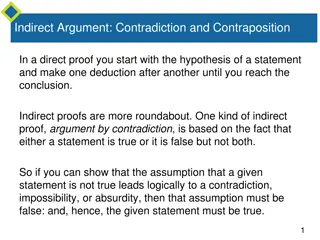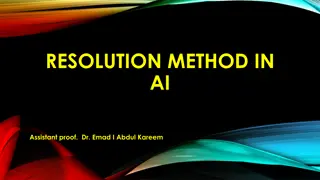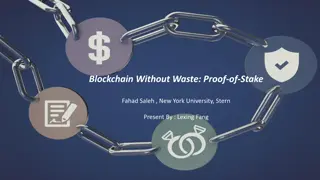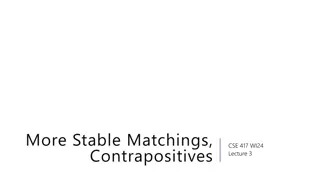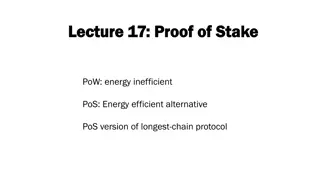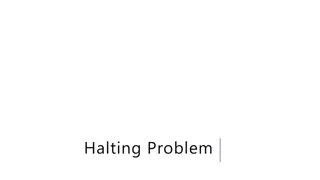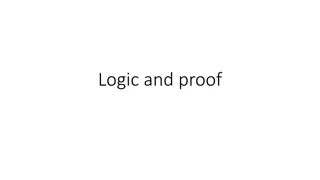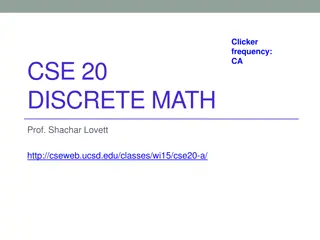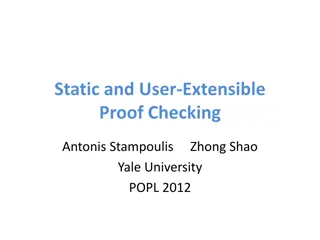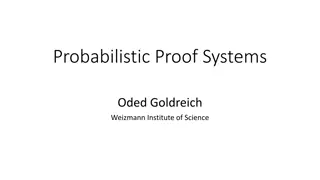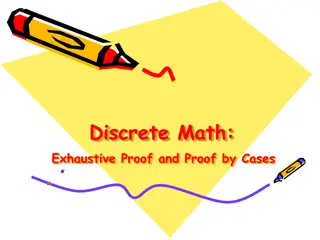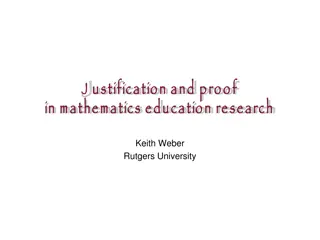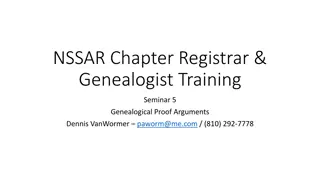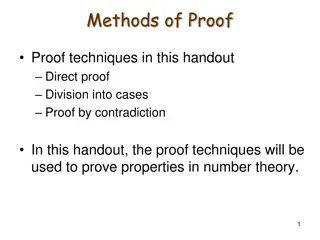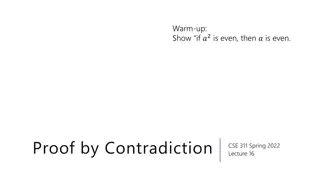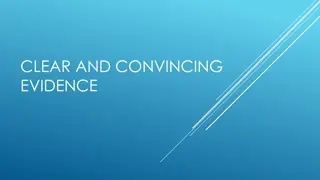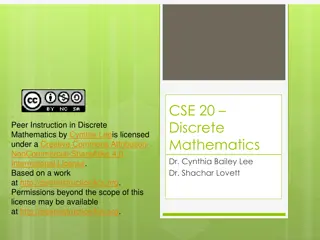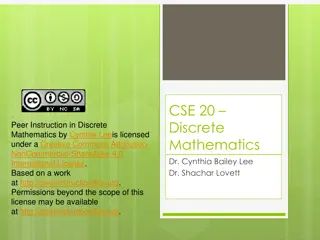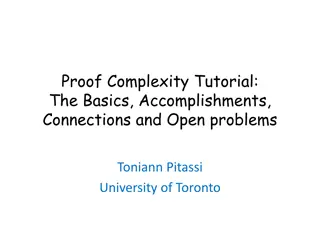Evolution of Mathematical Theories and Proof Systems
Development of mathematical theories such as model theory, proof theory, set theory, recursion theory, and computational complexity is discussed, starting from historical perspectives with Dedekind and Peano to Godel's theorems, recursion theory's golden age in the 1930s, and advancements in proof t
4 views • 29 slides
Indirect Proofs: Contradiction and Contraposition Examples
Indirect proofs offer a roundabout approach to proving statements, with argument by contradiction and argument by contraposition being the main techniques. Argument by contradiction involves supposing the statement is false and deriving a contradiction, while argument by contraposition relies on the
10 views • 18 slides
RESOLUTION METHOD IN AI
Resolution method in AI is an inference rule used in propositional and first-order predicate logic to prove sentence satisfiability. It employs a proof by refutation technique to achieve contradiction, ultimately concluding the original goal's truth. The process involves converting statements to cla
3 views • 12 slides
Blockchain Without Waste: Proof-of-Stake
A study on Proof-of-Stake (PoS) as an alternative to Proof-of-Work (PoW) in blockchain technology. PoS aims to create a sustainable permissionless blockchain by selecting a stakeholder to authorize transactions without the heavy energy consumption of PoW. The paper provides a formal economic model o
4 views • 16 slides
Gale-Shapley Algorithm for Stable Matchings
Exploring the Gale-Shapley Algorithm, this content dives into the process of generating stable matchings, analyzing efficiency, and proving its correctness through claims. Concepts such as perfect matching, blocking pairs, and proof by contradiction are elucidated to showcase the algorithm's reliabi
2 views • 29 slides
Proof of Stake: Energy-Efficient Alternative to Proof of Work
Proof of Stake (PoS) is presented as an energy-efficient replacement for Proof of Work (PoW) in blockchain protocols. PoS allows meaningful participation based on stakeholders' coin ownership, proportional to their stake. The process of finding nonces in PoW is replaced by owning coins in PoS to par
0 views • 16 slides
Mathematical Proof Methods and Divisibility Rules
In this lesson, we explore various methods of proof in mathematics, including direct proof, contrapositive, proof by contradiction, and proof by cases. We delve into basic definitions of even and odd numbers and learn about proving implications. Additionally, the concept of divisibility, prime numbe
0 views • 30 slides
The Halting Problem and Uncomputable Programs
The Halting Problem in computer science presents a practical uncomputable problem where determining whether a program will halt or run forever is impossible. This concept is explored through a proof by contradiction and a tricky program called Diagonal.java. The program showcases the challenges of p
3 views • 23 slides
Insights into Logic and Proof: A Historical Journey
Delve into the historical timeline of logic and proof, from ancient Egyptian mathematical activities to modern advancements in computational proof assistants. Discover the evolution of symbolic logic and the development of proof systems like natural deduction. Explore the significance of logical exp
4 views • 36 slides
Proof by Contradiction in Discrete Math
Explore the concept of proof by contradiction in discrete math through examples and templates. Learn how to derive contradictions to establish the truth of theorems, with demonstrations on topics like integers being both even and odd. Discover the power of contradictions in challenging assumptions a
4 views • 19 slides
Architecture and Challenges of Proof Assistants
Explore the architecture of proof assistants, discussing the use of tactics, formal proofs, and the difficulty in utilizing these tools. Discover the contribution of a new architecture for proof assistants, addressing extensibility and error checking, with a focus on soundness guarantees. Delve into
4 views • 41 slides
Probabilistic Proof Systems in Complexity Theory
Explore the world of probabilistic proof systems in complexity theory through the works of Oded Goldreich from the Weizmann Institute of Science. Dive into concepts like NP-proof systems, interactive proof systems, completeness, soundness, and efficient verification procedures with a focus on applic
1 views • 15 slides
Exhaustive Proofs and Proof by Cases in Discrete Math
Exhaustive proofs and proofs by cases are essential methods in discrete mathematics for proving theorems. Exhaustive proofs involve checking all possibilities, while proof by cases focuses on considering different scenarios separately. The methods are illustrated through examples like proving (n+1)^
2 views • 8 slides
Perspectives on Justification and Proof in Mathematics Education Research
This presentation explores diverse perspectives on proof in mathematics education, highlighting the role of proof in K-12 classrooms and discussing students' challenges with proof. It delves into research perspectives on what constitutes a proof, the goals of mathematics educators, and the link betw
6 views • 74 slides
Genealogical Proof Arguments and SAR Standard of Proof
This detailed content covers the definitions and components of genealogical proof arguments, proof summaries, and the SAR standard of proof. It explains the importance of evidence quality, source citations, and analysis in establishing acceptable genealogical conclusions for SAR membership applicati
4 views • 22 slides
Proof Techniques in Number Theory
Explore methods of proof, such as direct proof and proof by contradiction, to establish properties in number theory. Learn about even and odd integers, the method of direct proof, writing proofs effectively, common mistakes to avoid, and types of mathematical statements like theorems, propositions,
3 views • 15 slides
Proof by Contradiction in Mathematics
Proof by contradiction is a powerful technique used in mathematics to establish the validity of a statement by assuming its negation leads to a contradiction. This method involves supposing the opposite of what needs to be proven and demonstrating that this assumption inevitably results in an incons
15 views • 21 slides
Burden of Proof and Standards of Evidence in Legal Proceedings
In legal proceedings, the burden of proof determines which party must prove their case to the trier of fact. The standard of proof refers to the level of certainty required to establish proof, with higher stakes demanding a higher standard. Decision-makers must apply clear and convincing evidence st
12 views • 13 slides
Direct Proof by Contradiction in Mathematics
Learn about direct proof by contradiction in mathematics, including the process, examples, and applications. Understand how to prove statements by assuming their negations and deriving a contradiction to establish the original statement's truth.
2 views • 9 slides
Peer Instruction in Discrete Mathematics: Knights and Knaves
Dive into the world of Knights and Knaves with peer instruction in discrete mathematics by Dr. Cynthia Bailey Lee and Dr. Shachar Lovett. Explore proof by contradiction, Fibonacci numbers, and more in an engaging learning experience.
1 views • 15 slides
Peer Instruction in Discrete Mathematics: Knights, Knaves, and Contradictions
Explore the fascinating world of Knights and Knaves logic puzzles, along with the concept of proof by contradiction, in the realm of Discrete Mathematics. Dive into scenarios where truth and falsehood intertwine, challenging your logical thinking. Unravel mysteries and contradictions in a stimulatin
3 views • 17 slides
Logical Inference and Resolution Methods
Resolution is a sound and complete inference procedure for FOL, covering cases like Modus Ponens and contradiction detection in propositional logic. First-order logic resolution involves deriving resolvent sentences from given clauses. A resolution proof tree and refutation method are also discussed
1 views • 12 slides
Undecidability and the Halting Problem
Delve into the fascinating world of undecidability, where problems remain unsolvable even with finite time algorithms. Learn about the Halting Problem and its implications, including the impossibility of determining if a program will halt or run infinitely. Discover the concept of NP-complete proble
2 views • 24 slides
Probabilistic Proof Systems in Theoretical Computer Science
Explore the concepts of Probabilistic Proof Systems in theoretical computer science, including NP-proof systems and interactive proof systems. Learn about efficient verification procedures, completeness, soundness, and their applications in cryptography and approximation. Discover the role of random
4 views • 15 slides
Unveiling Proof Complexity: Basics, Connections, and Open Problems
Delve into the world of proof complexity with a tutorial covering propositional, algebraic, and semi-algebraic proof systems, fundamental connections to complexity theory, algorithmic implications, and open problems. Explore resolution, restricted forms, and the Proof Complexity Zoo along with algor
2 views • 76 slides
Proof Techniques: Evenness of 2 and Its Implications - CSE 311 Autumn 2024 Lecture 12
Explore the proofs related to the evenness of the number 2 and its implications, including direct proof, contrapositive, and proof by contradiction. Understand the reasoning behind these techniques through examples and application in mathematical assertions.
2 views • 31 slides
Logic Proof Techniques & Propositional Logic Overview
Explore proof techniques in logic like proof by cases, proof by contradiction, and proof by induction. Learn about propositional logic concepts such as distributivity, DeMorgan's Law, and truth tables. Get insights on computational complexity, recursion, data structures, and more.
6 views • 32 slides
Methods of Proof in Mathematics
Basic definitions of even and odd numbers, methods of proof including direct, contrapositive, and proof by contradiction, and simple divisibility facts in mathematics.
0 views • 30 slides
Discrete Mathematics for Computer Science - Proof Techniques and Examples
Explore proof techniques such as proof by contraposition and proof by cases in the context of discrete mathematics for computer science. Learn how to derive and apply contrapositive forms, understand truth tables for implications, and see examples illustrating the application of these concepts in pr
4 views • 23 slides
Discrete Math Fall 2020: Proof Techniques, Greatest Integer, Prime Numbers
Explore proof techniques in discrete math, including evaluating proof by contradiction, disproving existential claims, and analyzing the existence of greatest prime numbers. Understand the concepts of greatest integer, least integer, and more. Delve into the theorem that there is no greatest prime n
1 views • 28 slides
Proving the Infinity of Prime Numbers Through Contradiction
Explore how the set of prime numbers is infinite by using a contradiction approach. By assuming the set is finite and has a 'largest prime number,' we demonstrate the existence of a larger prime, debunking the assumption of finiteness.
1 views • 10 slides
Discrete Math Proof Strategies and Reasoning Techniques
Discover effective strategies for finding proofs in discrete math, including forward and backward reasoning methods. Learn how to analyze hypotheses and conclusions, apply direct and indirect proofs, and employ proof by contradiction. Explore examples and solutions to enhance your understanding of p
2 views • 6 slides
Logic Rules and Proofs for Mathematical Theorems
Explore the basics of logic rules and apply them to prove mathematical theorems using direct proofs, contrapositive, proof by contradiction, and proof by cases. Understand predicate calculus validity, universal generalization, and techniques for proving implications. Dive into concepts like even and
2 views • 34 slides
Understanding Probabilistic Proof Systems in Computer Science
Delve into the world of probabilistic proof systems as defined by Oded Goldreich from the Weizmann Institute of Science. Explore the concepts of traditional NP-proof systems, interactive proofs, zero-knowledge proof systems, and their essential components such as interaction, randomness, and error p
0 views • 9 slides
Understanding Standards of Proof and the Presumption of Innocence
Explore the intricate relationship between standards of proof and the presumption of innocence in criminal law, delving into the binary concept of innocence and guilt, burden of proof, and the different levels of standards of proof. Learn how these standards play a crucial role in determining guilt
2 views • 10 slides
Discrete Structures Proof by Contradiction Overview
Explore the concept of proof by contradiction in discrete structures with examples illustrating its application. Understand the method, rationale, and implications of proving statements through logical contradictions. Discover the effectiveness and potential pitfalls associated with this proof techn
0 views • 20 slides
Comparing Proof Systems for Linear Real Arithmetic at University of Iowa
Explore the research conducted at University of Iowa and New York University on comparing proof systems for linear real arithmetic using LFSC. Discover the motivation behind the work, challenges in proof checking, and the use of LFSC for certification of QF_LRA proofs. Dive into the detailed overvie
0 views • 37 slides
Probabilistic Proof Systems: Exploring Efficient Verification Processes
Explore the world of probabilistic proof systems, from traditional NP-proof systems to interactive proof systems, focusing on efficient verification procedures and the role of randomness and interaction in the verification process. Understand the concepts of completeness, soundness, and error probab
5 views • 15 slides
Introduction to Proofs and Reasoning in Mathematics
Explore the use of reasoning and logic in mathematical proofs, including inductive and deductive reasoning, different proof strategies such as direct proof and proof by contradiction, as well as if and only if proofs. Discover the fundamentals of two-column proofs and how to apply them in mathematic
0 views • 11 slides
Understanding Irregular Languages and Proof Techniques in CSE
Explore the concept of irregular languages in the context of NFAs, DFAs, and Regexes, alongside proof techniques to demonstrate the limitations of DFAs. Discover how to prove an irregular language by contradiction, showcasing the inherent challenges in designing deterministic finite automata.
4 views • 23 slides

